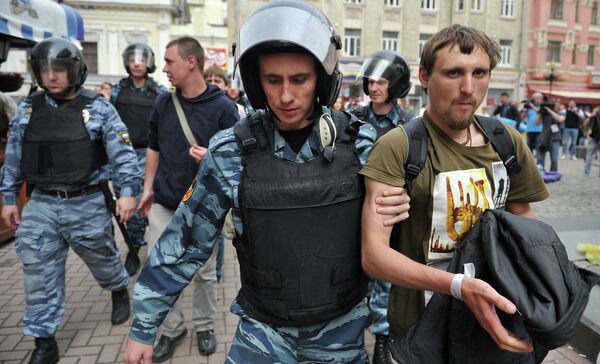The Kremlin human rights council plans to ask President Vladimir Putin to veto a controversial new law that could see fines for unsanctioned protests rise by as much as two hundred times, the advisory council said on Wednesday.
“The council intends to appeal to the president if the law is approved by both houses of parliament,” the council said in a statement.
Putin later reprimanded the head of the council.
“You’ve expressed concern over the amendments," Putin told council head Mikhail Fedotov at a meeting of the ruling United Russia party. "[But] you’ve addressed me through the media. You’re a presidential advisor, you can go directly to the president."
Putin also said the new law should protect society from "radicalism" and "strengthen the democratic nature of our state and our society."
The controversial draft bill was approved in the first reading by Russia’s lower house, the State Duma, on Tuesday, despite opposition objections and comes in the wake of unprecedented protests against Putin’s rule. Six people, including Sergei Mitrokhin, leader of the liberal opposition party Yabloko, were detained at a protest in Moscow ahead of the hearing.
The draft bill could see the maximum fine for participation in illegal demonstrations go up from the current 5,000 rubles ($160) to 900,000 rubles ($29,000), an amount far beyond the means of all but the very wealthiest of protesters. Opposition anger and public pressure are, however, expected to result in the maximum fine falling to 300,000 rubles ($9,600) in the second reading.
Fines for the organizers of protests that fail to comply with federal regulations on demonstrations would shoot up from 50,000 rubles ($1,160) to 1.5 million rubles ($48,000), a figure that is unlikely to change when parliament considers the bill again on June 5.
“These fines exceed the annual earnings of an average worker,” said veteran rights activist Lyudmila Alexeyeva, who is also a member of the Kremlin rights council. “They might have similar fines in other countries, but people earn a lot more.”
Average monthly salaries in Russia are around $900, although wages are much higher in Moscow and St. Petersburg.
“People will still go to demonstrations though,” Alekseeva added. “You can’t keep dissatisfied people at home.”
Several members of the Kremlin’s rights council quit their posts after Putin’s March 4 election victory, saying they could not work under an “illegitimate” president. Putin’s landslide poll triumph was marred by allegations of electoral violations and criticized by Western observers.
Vastly increased fines for illegal protests were proposed by deputies from the ruling United Russia party in the wake of clashes between police and demonstrators at a downtown Moscow rally on the eve of Putin’s May 7 inauguration as president for a third term.
Putin’s spokesman, Dmitry Peskov, reportedly told opposition lawmaker Ilya Ponomaryov earlier this month that protesters who injured riot police deserve to have their "livers smeared on the sidewalk.”
United Russia’s parliamentary majority ensured the draft bill was passed despite the objections of the three opposition parties – the Communists, the Liberal Democratic Party and the A Just Russia Party – with State Duma representation.
The draft bill could go through its second and third hearings in the lower house on June 5, State Duma deputy speaker Oleg Morozov said on Wednesday.
"It's possible it could be adopted the same day," Morozov said.
A new anti-Putin rally in due to take place in Moscow on June 12. The protest was announced earlier this month by Left Front leader Sergei Udaltsov, who was jailed for 15 days as demonstrators took to the streets again after Putin’s inauguration and is due to be released early on Thursday.
Prime Minister Dmitry Medvedev, who is set to take over the leadership of United Russia from Putin later this month, also criticized the proposed hike in fines last week, saying: “We need to change ourselves and not just make harsher punishments.”
And last Friday, the Constitutional Court ruled that organizers of protests should not be fined automatically when the attendance of rallies exceeds set limits, as is currently the case, unless this creates a genuine threat.


